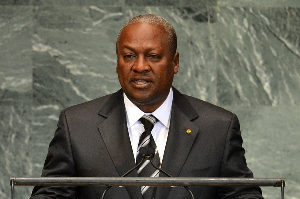Opinions of Friday, 13 April 2007
Columnist: Boamah, Ebenezer
Creation of More Regions: A Solution to Ghana's Political and Economical Emancipation?
The above question is in direct response to the proposal made by Prof Kumado at a lecture by Ghana@50 under the banner “The Degree of Our Commitment to Our National Motto: Freedom and Justice”, as in the reports posted by Ghanaweb on both the 29 and 31 of March 2007.
First of all, I would like to acknowledge that the professor’s knowledge and assessment of our nation’s history and developments is largely in order. Some are the situation of the 1992 elections and its controversies and the almost resultant near-to-civil-war; the timely intervention of religious leaders (not to mention the intercessory prayers of most Christians on the nation’s behave); and the pensive conduct of the then opposition in the face of the situation. His advice to the president to tour the country as much as he has the world (not to say that the world tours were not necessary), are all in order and worth noting. However, I strongly believe that his proposal for the creation of 10 more regions is a woefully misjudgment, especially given the reasons for such exercise that he stipulated (which I believe he himself would agree after reading this assessment).
Tribal Repressions and Conflicts in multi-tribal Regions The foremost of his reasons for the creation of more regions is to avert tribal repressions and conflicts in the regions. I don’t want to dispute the factuality of such a situation in some of our regions. However, his assessment that by the integration of smaller tribes and larger ones in a region means internal colonization or re-colonization is a very sorry understanding of such regional constitution by anybody. Cohabitation and co-operation of people of the same nation and state irrespective of the sizes and constitution of tribals in an integrated region is no colonialism, political dependence nor intrinsic repression of smaller tribes by larger ones; unless it is sin for us Ghanaians, as made of various tribes and groupings, to live together for our common good. Therefore what is the difference between the creations of regions along tribal lines from ‘Matemeho-ism’? Is this ideology of creating regions by tribes not counter-productive to our well-conceived quest to stronger tribal integration and national unity?
The solution to any perceived repressions and conflicts among tribes in common regions, and even nationally, is definitely not more disintegration along tribal divides, which would lead to more polarization and hostility among Ghanaians, but rather increased, if not rigorous, integrations of tribes and other groupings on every level. This is to be done by way of inter-tribal marriages, multi-tribal regional integrations rather, not grouping single tribes in single regions; well-tribally constituted political parties and such. This would rather make people see themselves as Ghanaians first, but not the professor’s proposal (as one of his complaints is that the current integrated multi-tribal regional system, based mostly on a little re-shuffling of the colonial provinces, does not augur well for nationalism; and that people still feel colonized). I believe there is no such a feeling like this on the ground but just an academic miscalculation. Administratively Unwieldy Regions Second of the professor’s argument for more regions is that the current sizes of our regions are too ‘unwieldy’ for administration and development. This one too, I strongly believe that it does not even take kindergarten lessons for one to know the illusionism of the assertion. Ghana’s underdevelopment has nothing to do with to big a region.
I do not want to go into lengthy geographical statistics; but the whole of Ghana itself is less in size and population to many regions/provinces, if not districts, of many countries, save to say our regions, which are rather insignificant comparatively in size and population administratively. For example one administrative region/province of China, Xinjiang Uygur is 3,165,596 sq km (Microsoft® Encarta® 2006) with a population of over 15,370,000; and more, which is made up of the larger Uygurs and many minority tribes like the Mongols and the Kazkhs; and yet the region/province is administered; tribes co-operate; and is more developed than our minute regions, (as the professor believes that parts of our regions are underdeveloped because they are too big for developmental administration). (I leave it to you to do the comparative calculations your self – not even the biggest and the most populous of our regions is anything comparable; save in population, not even our whole nation, which is the size of only 238, 500 sq km).
The professor also believes that smaller and tribalistic regions would lead to equitable development. I say this is another woeful misjudgment. That the underdevelopment of parts of the so-called unwieldy but multi-tribal regions are due to undue vastness is not true, because truly non of our regions are too big for developmental, economic or administrative purpose even as a plain region without any sort of developmental, economic or administrative divisions. However, our regions are subsequently divided from districts, district assemblages to wards in town, all for developmental purpose. Notwithstanding the superfluity, administrative disunity and bottlenecks, corruption and waste of resources that these tiny so-called developmental divisions bring, if however, these can not bring about equitable development, then I do not see how and why the same ideology of small regions would help.
It is also unreasonable of his assertion that our regions are too big for regional ministers to manage if the whole country could be managed by the one president. However, we all know that the regional minister, even as the president, has other men and women in place to help carry out duties. Under the guise of inequitable intra-regional development caused by adverse tribalism, as perceived by the professor, I say, even if that is a given fact, then his antidote for such a canker is rather a fertilizer for such situation. Why? This is because if the regional administrators are tribally biased in developing their regions, then we must note that they are a microcosm of the national administration. Given this as a logical fact, it would mean that the tribally demarcated regions would suffer even more, because then tribalist administrators and politicians could easily adversely target the proposed tribal regions, not only in infrastructural development but just about anything. However, the currently tribally mixed regions are as not vulnerable to tribalists. Conclusion I believe that the professor did not mean any harm, but just a grievous miscalculation on his part to contributing positively both to the real and perceived developmental and political freedom problems, respectively, within our regions. If he could be bold to retract his proposal, that would be very gallantry of him, and profitable to those he has already schooled; and more importantly for our national unity. If he can’t retract, however, a less difficult way of saying I was wrong is for him not to preach this counter-productive proposal anymore.
Our intellectuals must be very sober and reflective on what they say concerning national development and unity. If they don’t have any contribution when invited to speak, they must be just honest, and gentlemen and ladies to turn the invite down, because nobody knows it all at all times. Lesotho is a very tiny uni-tribal nation, and yet they suffer underdevelopment and repression. It is not a fact that tribalism and supposedly unwieldy regions are the causes of underdevelopment within our regions. The adverse consequence of creating region for every tribe of over 43 would be socially, economically, and politically untold. The current regional demarcations and other administrative divisions and structures must be made rather to work effectively and accordingly as drawn up in national policies. Also if there are adverse tribalistic tendencies in any of us, then we must rip them off our hearts, for there are no better workable ways to work around such destructive tendencies to achieving national unity and development.













